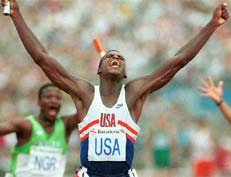 Lewis emulated Owens by winning four gold medals at the 1984 Los Angeles Olympics and went on to gather five more titles at three subsequent Games.
Lewis emulated Owens by winning four gold medals at the 1984 Los Angeles Olympics and went on to gather five more titles at three subsequent Games.
His most memorable gold followed a race in which he finished second. Lewis was awarded the 100 metres title at the 1988 Seoul Olympics after Canadian Bem Johnson tested positive for a banned steroid.
Lewis, born in Birmingham, Alabama, in 1961, was a man for his times.
After winning three titles at the first world championships in Helsinki in 1983 he was ideally poised to take full advantage of the new professional era in track and field at the Los Angeles Olympics the following year.
Lewis announced he intended to repeat Owens's feats at the 1936 Berlin Olympics by winning gold medals in the 100 and 200 metres, the long jump and the 4x100 metres relay.
His manager proclaimed Lewis would be bigger than singer Michael Jackson, then at the height of his fame.
Lewis swept to victory in all four events. However, there was a hint of things to come when segments of the crowd in the Colisseum booed when he took only two of his six long jumps to conserve energy for races to come.
After the Games, Lewis was the hottest property in track and field but to his frustration he never achieved the adulation and status at home he so openly coveted.
Acting and singing lessons served only to demonstrate he was no Michael Jackson and the sponsorship deals did not flood in.
CLOUD
His sport was also under a cloud. After Johnson won the 1987 world 100 title in world record time, Lewis hinted something was amiss without specifying exactly what.
Johnson's drugs bust in the following year proved the biggest scandal to hit the Olympics and a Canadian government inquiry in 1989
Last year it was also revealed that Lewis had tested positive for three stimulants during the 1988 Olympic trials.
An initial six-month suspension, which would have resulted in Lewis missing the Seoul Games, was overturned on appeal and the case was not made public at the time.
Through it all, Lewis continued to compete at the highest level, showing remarkable longevity for a sprinter.
In 1991 he astonished the world and himself by winning the Tokyo world 100 metres title in a world record 9.86 seconds. "The best race of my life. The best technique, the fastest. And I did it at 30," he marvelled.
Lewis then took part in the greatest long jump competition ever staged. He came into the event with 65 straight wins and it took a world record 8.95 metres from Mike Powell to break that streak. The previous mark of 8.90 metres had stood for 23 years.
Although Lewis never held the world record, he was unquestionably the best long jumper of all time.
He failed to qualify in either of his sprint events for the 1992 and 1996 Olympics but won the long jump gold medal on both occasions. At the latter Games in Atlanta, much of his speed and elasticity had vanished but his glorious technique remained as he won his fourth consecutive long jump title and his ninth and final gold medal.
In the ensuing days he engaged in a shameless and ultimately fruitless public campaign to get himself included on the 4x100 metres relay team event though he had not taken part in the training camp.
At the end of the Games, Lewis remained an enigma. Was he a man to match his deeds or was he a self-absorbed narcissist?
Of his athletic deeds there can be no doubt. Lewis in full flow was the finest sight in track and field for more than a decade.








 © 2025
© 2025